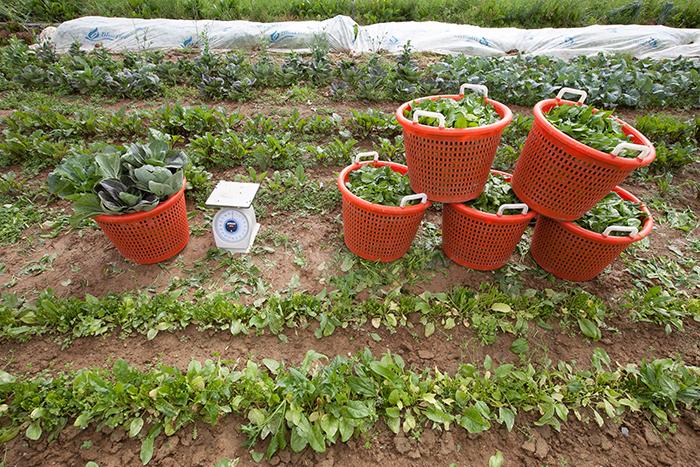The Food, Agriculture & Resource Management (FARM) Lab

Harvest time at the Dickinson College Farm. Photo by Carl Socolow '77.
Center for place-based learning and research proposed
by MaryAlice Bitts-Jackson
The Food, Agriculture & Resource Management (FARM) Lab proposes creating a new facility supporting research, coursework and co-curricular programs at Dickinson’s College Farm.
With roots in a student-run garden program that began in 1999, Dickinson’s College Farm was established in 2007. While supplying fresh, organic produce to the campus and surrounding community, it also hosts hundreds of academic and co-curricular events each year, creating a space for meaningful community outreach and civic engagement. But because the farm is an outdoor venue, these place-based experiences are currently limited to just a few months each year. A new, multi-use facility at the farm would promote cutting-edge, place-based learning and research and collaborative and interdisciplinary initiatives yearlong, says College Farm Director Jenn Halpin, who during the past 17 years, has shepherded the farm’s development from a community garden to a fully realized organic farm and living laboratory. The facility’s proposed name: the Food, Agriculture & Resource Management (FARM) Lab.
In keeping with Dickinson’s commitment to sustainability and with the College Farm’s longstanding work in that area, the FARM Lab would be a sustainable structure, using technologies such as waste-to-energy greywater recycling and high-efficiency construction. A preliminary architectural design was completed by David McIlnay ’87 in 2014 and could be updated to reflect new technologies now at the farm.
Halpin notes that the building itself would offer lessons in alternative energies, carbon neutrality and sustainable technologies in action, and it would facilitate longterm ecological studies, expanding coursework in sustainability and advanced innovative projects related to sustainable energy, land use and food systems—important global issues that help prepare students to serve the common good. “Through its design and construction, FARM Lab responds to global climate change and other significant environmental challenges, serving as a place where education, research, investigations and solutions can be fostered and implemented,” she explains.
By providing additional, yearlong space for student and campus programs and events, as well as revenue-generating outside events, the proposed facility also would help cultivate a sense of community within Dickinson and between Dickinson and the Carlisle region.
In all these ways, FARM Lab could engage Dickinsonians in important and complex issues—a truly revolutionary and very Dickinsonian pursuit, says Halpin. She adds that the result would be “new pathways for inquiry, reflection and action” and would prepare Dickinson students “who are innovative problem-solvers and support the common good.”
TAKE THE NEXT STEPS
Published January 31, 2021